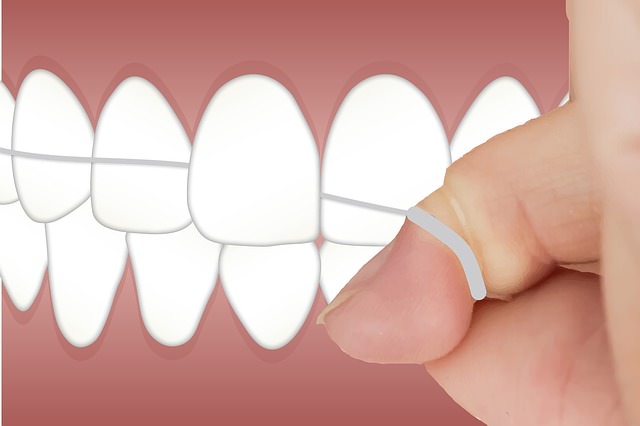In this article I’m going to address the many questions surrounding flossing your teeth and how safe the practice is.
 If you have signs of gum disease your dentist has definitely advised you to start flossing but a lot of people have questions as to whether flossing is safe.
If you have signs of gum disease your dentist has definitely advised you to start flossing but a lot of people have questions as to whether flossing is safe.
The short answer is a resounding yes, but it’s important for a lot of people to dig deep and find out the truth because a lot of people are against flossing, or are downright against it.
Here are the main points in this article:
- Can flossing damage gums?
- Can flossing stop toothache?
- Can flossing remove plaque?
- Will flossing loosen my dental crown?
- Does flossing fight gum disease?
- Will flossing cause gaps between my teeth?
- How many times a day should I floss?
- Can flossing stop my gums from bleeding when I brush?
- How does flossing positively affect my health?
- Does flossing get rid of bad breath?
Lets begin
Can flossing damage gums?
If flossing is not done properly, or done too vigorously, flossing can definitely damage your gums.
If you have not flossed your teeth ever, your first round of flossing is definitely going to be painful, and your gums are going to bleed.
This is because without flossing, your gums are constantly exposed to years of plaque and bacteria buildup which makes them swell and bleed easy.
Any kind of friction will cause them to bleed but that doesn’t mean you’re damaging them just yet.
The proper way to floss after years of neglect is by being as gentle as possible the first time, and mainly focus on removing the visible buildup of plaque that’s attached to your teeth.
Can flossing stop toothache?
If you have a cavity, there is no amount of flossing that will make the pain go away. In such a case your better off taking a pain killer like Advil, and calling your dentist immediately for a checkup.
If your teeth are hurting because of the swelling of your gums due to plaque build up, flossing can actually reduce inflammation and remove plaque that is causing your teeth to be sensitive.
On the other hand a sensitive tooth is not always only a sign you need to brush more. The pain could be a sign that you actually have a cavity.
Can flossing remove plaque?
The specific reason dental floss was invented was to help remove plaque buildup. The more you floss, the less plaque you’ll have around your teeth.
If you floss regularly – which is at least once a day – you’ll find you have very little plaque build up on your teeth and your teeth will appear more whiter.
Will flossing loosen my dental crown?
 Generally, flossing won’t hurt your teeth or cause them to crack, but if you floss too hard you could affect fillings and possibly dislodge a dental crown.
Generally, flossing won’t hurt your teeth or cause them to crack, but if you floss too hard you could affect fillings and possibly dislodge a dental crown.
The proper way to floss is to focus primarily on the area between your teeth, and below the gum-line. If you are careful and stay away from the top of your teeth where your crown is, you’ll be able to avoid damaging them.
Does flossing fight gum disease?
Flossing absolutely fights and can even get rid of gum disease (periodontitis).
When you floss regularly, you not only remove food-debris, but you also stir up and loose all the plaque and bacteria buildup from the day which is washed away after brushing.
Having gum disease means you have a major excess buildup of plaque and mouth bacteria (bad bacteria), and that your gums are receding.
With regular flossing, your gums will not grow back but they’ll stop receding. You simply have to make sure you floss every single day.
Its common knowledge that you can get rid of gum disease without a dentist, but you’ll have to be dedicated to a rigorous routine of flossing and using a WaterPik on a daily basis.
Will flossing cause gaps between my teeth?
The short answer is no but here’s why it looks like gaps between your teeth have increased after you start flossing.
When you don’t floss for a long time, and especially if you’re not brushing properly or regularly, the plaque and bacteria buildup starts to eat away at your gums.
You generally don’t notice that your gums are receding at first because you can see the recession due to the plaque buildup hiding the gaps.
Once you start flossing, you’ll remove all the plaque, and you’ll start to see how much your gums have receded.
This is primarily why people that start flossing after decades of neglect think that flossing will cause their gums to recede but the opposite is true: flossing will stop your gums from receding but you have to make sure you floss every single day, and visit your dentist for regular cleanings and teeth whitening procedures.
How many times a day should I floss?
Definitely floss once a day, but if you can floss twice a day your gums and teeth will get healthier each day.
We usually each more than once a day so there’s nothing wrong with making sure you floss after every meal. The best way to enhance this practice is to brush as much as you floss so as to remove the sugar which turns into bad-bacteria if you don’t.
Here’s a tip: floss first and then brush after.
Can flossing stop my gums from bleeding when I brush?
The short answer is yes! If your gums are bleeding when you brush it’s because they’re swollen and extremely sensitive.
At this stage, brushing will cause them to bleed but starting a regular regiment of flossing will make the bleeding go away – within a few days too.
How does flossing positively affect my health?
Flossing stops the development of gum disease. Gum disease has been closely observed to cause other physical health issues including heart disease, diabetes, strokes, arthritis and many more problems.
The main cause is the bad bacteria that builds up in your body so with a regular schedule of flossing, swishing, oral irrigation and regular teeth cleanings, the rest of your body is going to remain healthy and enjoy the benefits.
Does flossing get rid of bad breath?
Yes. Bad breath is caused by the build-up of plaque and bacteria in your mouth.
Getting rid of plaque and oral bacteria will get rid of your bath breath too.
Flossing will also remove food debris that could be lodged in the pockets between your teeth that may be rotting and causing an odour.
After a few days of regular flossing you’ll start to notice that the bad taste in your mouth has gone away and so has the odour.
If you floss regularly, the bad breath associated with food debris or gum disease will go away and you’ll only have to worry about your breath smelling bad after you’ve eaten food like garlic or onions.
Brush and floss every day and you’ll notice that your bad breath is a thing of the past.






Be First to Comment